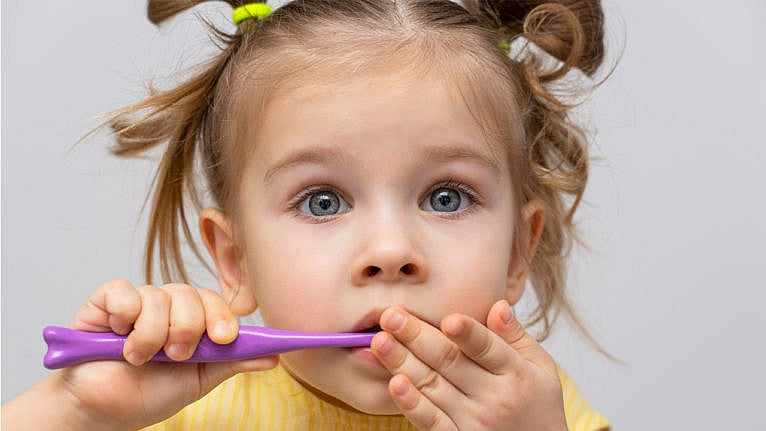By Emily Senger
For Edmonton mom Amie Gray, tooth-brushing was a nightly struggle from the time her son, Henry, was around 14 months old. “He would fight it,” Gray recalls. “I would sit with him on my lap, with his back to me. It sounds really mean, but I’d have to hold his arms down and brush with the other hand.”
Even though Henry probably wasn’t convinced, Gray was doing the right thing by forcing it. Baby teeth need proper care, even if they do fall out eventually. “Baby teeth are very important for function, for aesthetics and for guiding the permanent teeth into the appropriate positions,” says Farida Saher, a paediatric dentist in Calgary.
Saher recommends brushing with an actual brush (rather than wiping with a cloth) as soon as the first teeth come in, because the bristles get into the gum line, the area where cavities initially form. While you should brush twice a day, doing it before bed is most important, because while your tot is lying (generally) still, bacteria has a chance to grow undisturbed. And any sugar left in the mouth, from milk or food, gives bacteria an even better environment in which to grow. Because of this, Saher says, parents ideally shouldn’t nurse or give a bottle right before bed. If you do, the best practice is to wipe off your child’s teeth and gums afterward, or try to do your teeth-brushing session after the last bottle or sippy cup of the night.
If you’re struggling to follow a proper brushing routine with your toddler, know that even the pros have problems. “It took both my husband and me to hold our son down to brush his teeth,” recalls Sally Lloyd, a dental hygienist in Calgary. But no one wants a twice-daily battle with a toddler, so what’s the parent of a squirmy, stubborn kid to do?
Jessica Ray, a registered dental assistant in Red Deer, Alta., suggests trying to make it fun. “Turn tooth-brushing time into a happy time. Sing songs. Make up rhymes,” she says. In our house, my husband and I would sing the Raffi classic “Brush Your Teeth” to our daughter, Rosalind. (Sometimes she loved it; sometimes it was the backing track to whining and crying.) Some parents give their toddlers a mirror; others try getting them excited with books about tooth-brushing. There’s also a popular Elmo video (“Brushy Brush”) on YouTube featuring celeb cameos.
Lloyd says having two toothbrushes can also help. “If you give your child a toothbrush to hold and then use another, sometimes he’s distracted enough that you can get yours in there and brush,” she explains. Letting your kid brush first and then finishing the job yourself is also a good strategy. If you’re tempted to skip your turn with the toothbrush, don’t be. Kids this age can’t be counted on to properly clean their teeth. (“Even four- or five-year-olds brushing on their own some- times only get three teeth out of 20,” says Lloyd.)
You could also try a rechargeable electric toothbrush, which Ray says helped her clean her son Drake’s teeth when he was a toddler. “An electric toothbrush can usually do a better job than a manual one while you’re in there for short little bursts of brushing,” she says. (Kids’ disposable electric toothbrushes, however, could be too big and cumbersome for some little mouths and hands.)
Saher acknowledges brushing a toddler’s teeth can be tough, but she urges parents to think about how much harder it would be for their child to get a filling. If you do see any brown or bright white spots, don’t hesitate to contact a dentist. Baby teeth are weaker than adult ones, so decay can progress quickly. “It’s better to have a dentist look and say it’s nothing than to let it brew over time,” says Saher.
After months of struggling with Henry, Gray tried reading him a story while brushing, which worked better. Henry, who is now two, is also picking up on his parents’ good habits. “Now, when Henry sees us brushing our teeth, he wants to brush, too,” Gray says. Her perseverance is paying off. Henry’s teeth are healthy and, on most nights, brushing happens without tears.
Fluoride 411
Some cities and towns add fluoride to their water, others don’t. In municipalities without fluoridated water, paediatric dentist Farida Saher says a rice-size bit of adult or kid toothpaste with fluoride should be used for kids under age three. This small amount won’t cause any harm if swallowed, and it will help protect teeth. “If they can spit, great. If they can’t, don’t worry about it,” she says. (Teach them to spit in the bathtub.) As for those trainer toothpastes without fluoride—they might taste good, but other than that, they pretty much do nothing, says Saher. “You may as well just brush using water.”

